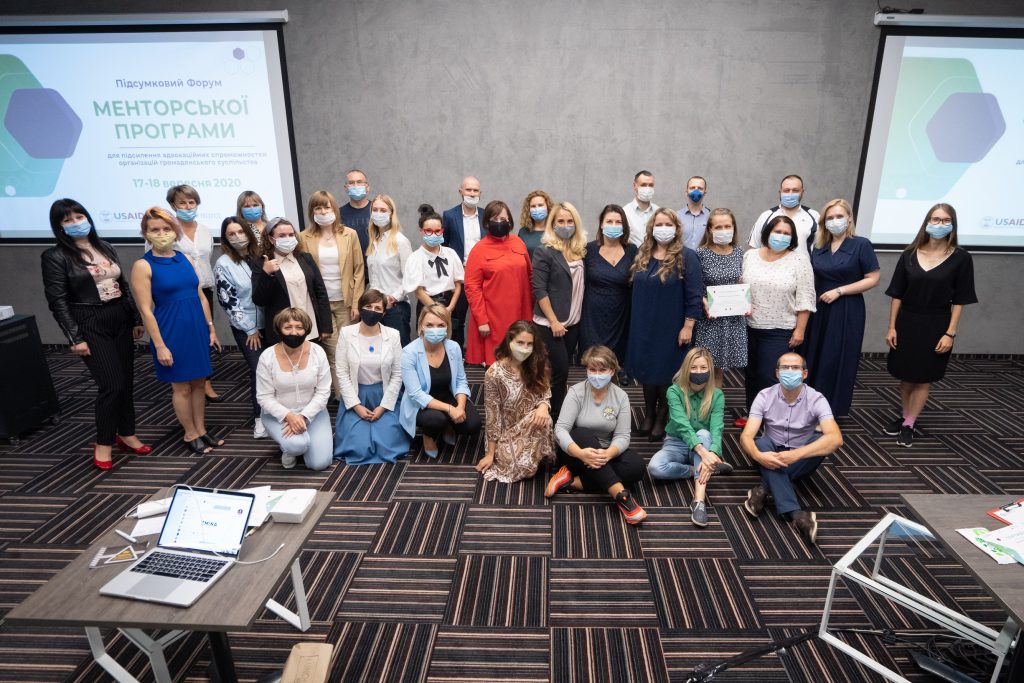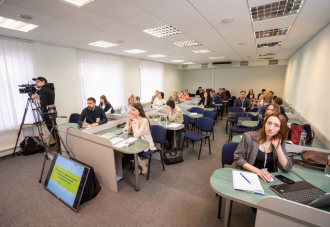A year has passed since the launch of Mentoring Program 1.0 to strengthen the advocacy capacity of civil society organizations (CSOs). 15 NGOs participated in it, 14 of them successfully completed the Mentoring Program, and 13 organizations developed joint advocacy plans with mentors. We decided to ask the graduates of the program about their successes and skills and knowledge they acquired.
Since one of the main advantages for the Mentoring Program participants is the opportunity to meet interesting people and cool organizations, we also asked the participants from each NGO to tell us how they use the acquired knowledge and skills.
NGO “Women Initiative Foundation” (Severodonetsk) aims to: ensure effective access for people with disabilities and low mobility groups to high-quality educational services. The team has already prepared an Analytical Report with recommendations for resolving problematic issues.
Halyna Tatarenko: “The skills have come in handy when we were preparing grant applications, competition applications, letters and inquiries.”
The Center for Innovative, Social, Physical and Intellectual Development “People.ua”, which is focused on building a network of youth centers in Melitopol, has got the ball rolling in developing a project to expand the area of the youth center.
Tetiana Nesvat: “Understanding the cooperation between stakeholders in politics in the city is very helpful in the current work.”
NGO Agency “Damo Radu” (Lviv) is developing a mechanism to address the problem of non-payment of pensions to migrant workers while working in countries with which Ukraine does not have international agreements in the field of social protection (in particular, in Italy). They co-organized the international conference “Transnational Rights of Migrants” and prepared recommendations for the relevant committee of the Verkhovna Rada of Ukraine. The recommendations included suggestions for solving the problem they were working on during the Mentoring Program.
Yaryna Khomtsii: “Knowledge and skills were used in the preparation of the international conference in accordance with our advocacy plan. We also use knowledge about organizational development in further planning of activities. In particular, it is planned to introduce a CRM system for the current year, where the processes will be described in detail”.
NGO “VeloStryiky” (Stryi) develops bicycle lanes and bicycle parking lots. They signed a memorandum with 28 other NGOs, solicited support of the Silpo and Nova Poshta chains to create bicycle parking lots, and received support from the city budget.
Yurii Vazhnyi: “All the skills gained were useful in signing a memorandum with other NGOs and in communication with the authorities.”
NGO “Our city is our home” solves the problem of infrastructural neglect of Domanyntsi and Dravtsi districts in Uzhhorod. The team continues negotiations with the representatives of local governments, as well as engages partners.
Maryna Stashyna-Neimet and Oleksandr Neimet: “Thanks to the knowledge of data processing, we managed to realize the algorithm of why our neighborhoods are unattractive not only for tourists but also for businesses. While participating in the Program, I made assumptions, but now I have found some confirmation in conversations with businesses and the public.”
NGO “Institute of Civic Education and Labor” (Chernihiv) dealt with the problem of insufficient influence of trade unions at the state level in the preparation of the draft law No. 2681. In particular, the organization has prepared an advocacy action plan in this area. And although this draft law was withdrawn from consideration, advocacy activities are now being intensified again.
NGO “YAReformatsiia” together with NGO “Foundation of United Hearts” is working on the introduction and dissemination of the practice of providing early intervention services in Kryvyi Rih for families raising young children (0-4 years old) with developmental disabilities or risk thereof. They are implementing the project “Early intervention on the way to a healthy nation” at the expense of the local budget.
Nataliia Pastushenko: “The “stakeholder map” and the “level of Influence” scale helped a lot in finding an influential person and like-minded people.”
NGO “Korolivske Youth” wants to create a Youth Center. They have already managed to create a Youth Council and open a youth space “Summer Theater” in Zhovkva (Lviv Region).
Orest Borys: “In addition, we have expanded our geography and started creating a youth space in the village of Dobrosyn and the Youth Council at the Dobrosyn-Maheriv Village Council. The DobroSyn youth project has become one of the winners of the regional pitching of social action projects from the British Council.
NGO “Gender Creative Space” (Lutsk) chose for themselves the topic of inefficiency of the institute of gender commissioners in communities last year. Here are the successes of the organization for the year: at the community level, an authorized person (coordinator) has been appointed to ensure equal rights and opportunities for women and men, and to prevent and combat gender-based violence in the Horodyshche community. A comprehensive program “Ensuring equal rights and opportunities for women and men of Horodyshche community for 2021-2025” has been approved. The team also became a partner of the AUC project “Institute of Gender Commissioners as a Mechanism for the Development of a Socially Oriented Community” and a participant in many competitions.
Halyna Yerko and Halyna Berezhna: “When planning and designing our activities in and out of projects, we always pay attention to such a component as advocacy and use the knowledge and skills that have been acquired and formed in the mentoring program.”
NGO “Laboratory of Initiative Youth” is working on the lack of a mechanism for garbage collection and disposal in Nizhyn, focusing on the educational component. Therefore, a tank for separate waste collection was installed in the Nizhyn City Youth Center, which is part of the educational sorting chain (as planned during the advocacy campaign). In addition, the Nizhyn_ECOdvizh social action project received support from the British Council.
Anzhela Tymchenko: If we take the general organizational development of our NGO as a result of participation in the mentoring program, we have strengthened our position in the regional Union of Initiatives of Chernihiv Region, become a regional partner of the Civil Society Development Forum “Immunity to Illusions” from Initiative Center to Support Social Action “Ednannia”, improved our communication component on Facebook. We also created a page on Instagram, held a general meeting after 2 years of work, updated the composition of the Board, “cleared” the membership of NGOs, introduced membership fees.
NGO “We are from Ukraine” tackled the problem of excessive use of plastic bags in the Storozhynets Territorial Community (Chernivtsi Region) last year. The team launched an annual campaign for the International Week without Polyethylene, the campaign “Brendaudit”. The organization was included in the number of partners of the global movement, which envisages a future free of plastic pollution #breakfreefromplastik. Also, they received support from local businesses, with which they plan to work on making their business greener.
Yuliia Kalashnikova: “Skills help to overcome barriers that have previously prevented activities in the community, to cover their activities in the media and social networks. We find common ground for cooperation with local authorities. We are working on projects on the tools of local democracy.”
NGO “Smart Media” (Kharkiv) chose the topic of raising the level of knowledge and awareness of citizens about political processes through expert communication. To do this, they held an “Election Council” together with mentors.
Center of Public and Media Initiatives (Kharkiv) is working on the topic of medical waste management and they are currently sharing the experience gained within the Zero Waste Academy.
Anna Prokaieva: “From now on, we know how to develop advocacy campaigns.”
The mentoring program to strengthen the advocacy capacity of civil society organizations was made possible through the sincere support of the American people through the United States Agency for International Development (USAID) within the Civil Society Sectoral Support Initiative project.




